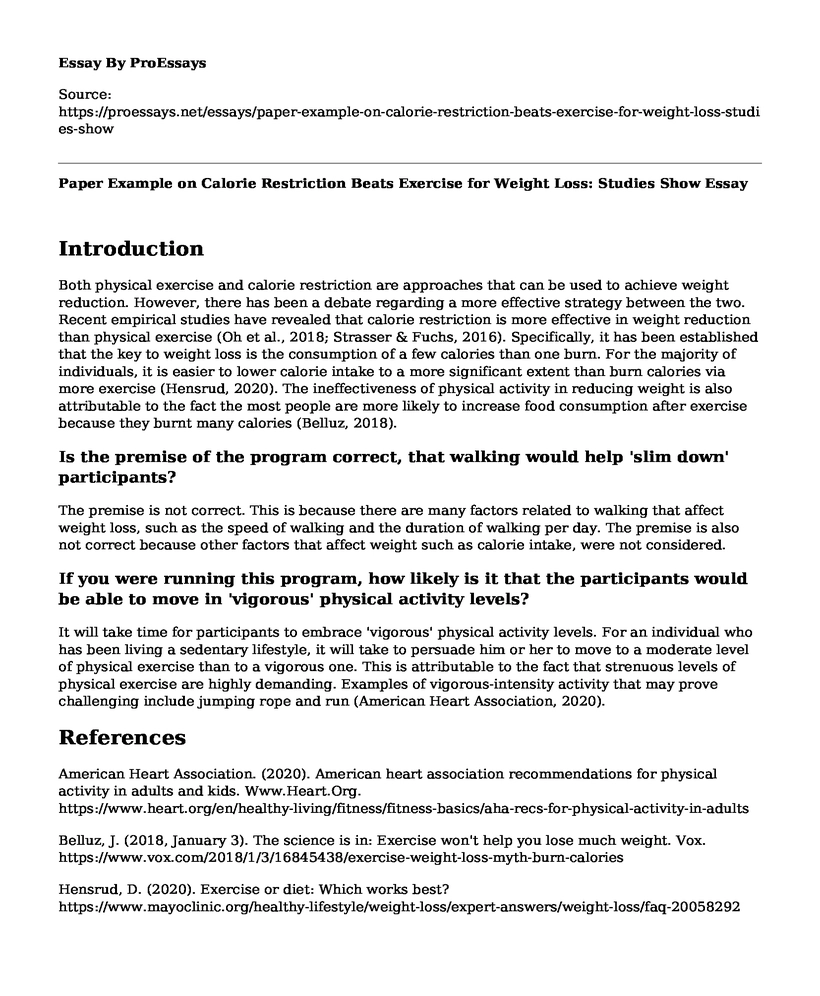Introduction
Both physical exercise and calorie restriction are approaches that can be used to achieve weight reduction. However, there has been a debate regarding a more effective strategy between the two. Recent empirical studies have revealed that calorie restriction is more effective in weight reduction than physical exercise (Oh et al., 2018; Strasser & Fuchs, 2016). Specifically, it has been established that the key to weight loss is the consumption of a few calories than one burn. For the majority of individuals, it is easier to lower calorie intake to a more significant extent than burn calories via more exercise (Hensrud, 2020). The ineffectiveness of physical activity in reducing weight is also attributable to the fact the most people are more likely to increase food consumption after exercise because they burnt many calories (Belluz, 2018).
Is the premise of the program correct, that walking would help 'slim down' participants?
The premise is not correct. This is because there are many factors related to walking that affect weight loss, such as the speed of walking and the duration of walking per day. The premise is also not correct because other factors that affect weight such as calorie intake, were not considered.
If you were running this program, how likely is it that the participants would be able to move in 'vigorous' physical activity levels?
It will take time for participants to embrace 'vigorous' physical activity levels. For an individual who has been living a sedentary lifestyle, it will take to persuade him or her to move to a moderate level of physical exercise than to a vigorous one. This is attributable to the fact that strenuous levels of physical exercise are highly demanding. Examples of vigorous-intensity activity that may prove challenging include jumping rope and run (American Heart Association, 2020).
References
American Heart Association. (2020). American heart association recommendations for physical activity in adults and kids. Www.Heart.Org. https://www.heart.org/en/healthy-living/fitness/fitness-basics/aha-recs-for-physical-activity-in-adults
Belluz, J. (2018, January 3). The science is in: Exercise won't help you lose much weight. Vox. https://www.vox.com/2018/1/3/16845438/exercise-weight-loss-myth-burn-calories
Hensrud, D. (2020). Exercise or diet: Which works best? https://www.mayoclinic.org/healthy-lifestyle/weight-loss/expert-answers/weight-loss/faq-20058292
Oh, M., Kim, S., An, K.-Y., Min, J., Yang, H. I., Lee, J., Lee, M. K., Kim, D.-I., Lee, H.-S., Lee, J.-W., & Jeon, J. Y. (2018). Effects of alternate day calorie restriction and exercise on cardio-metabolic risk factors in overweight and obese adults: An exploratory randomized controlled study. BMC Public Health, 18(1), 1124. https://doi.org/10.1186/s12889-018-6009-1
Strasser, B., & Fuchs, D. (2016). Diet versus exercise in weight loss and maintenance: Focus on tryptophan. International Journal of Tryptophan Research : IJTR, 9, 9-16. https://doi.org/10.4137/IJTR.S33385
Cite this page
Paper Example on Calorie Restriction Beats Exercise for Weight Loss: Studies Show. (2023, Jun 19). Retrieved from https://proessays.net/essays/paper-example-on-calorie-restriction-beats-exercise-for-weight-loss-studies-show
If you are the original author of this essay and no longer wish to have it published on the ProEssays website, please click below to request its removal:
- Pharmaceutical Patents Essay
- Portability Principle Violation Under the Canada Health Act Essay
- King`s Conceptual System Theory Essay Example
- Difference in Participants' Selfcare and Social Support - Research Paper
- Should Parents Refuse Vaccines for Their Children? - Research Paper Example
- North Memorial Health Hospital: 60 Years of Emergency Care - Research Paper
- Paper Example on The Pfizer Works Program







